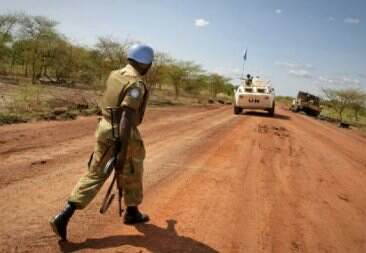UNISFA, Dinka Ngok traditional leaders meet over insecurity
October 23, 2016 (ABYEI) – The United Nations peacekeeping force in Abyei (UNISFA) organized, on 30 June, a meeting with the Ngok Dinka traditional leaders to discuss ways and means of finding a lasting remedy to insecurity in the disputed oil-producing region.

An agreement, UNISFA said, was reached to suspend market activities until a joint meeting between both communities was held to control and manage various security and administrative aspects of running the joint market.
“The temporary suspension of the common market had an impact on the humanitarian and recovery situation in the Abyei Area, as well as in the neighbouring areas in South Sudan, as trading activity was paused to allow for security mechanisms to be put in place prior to the resumption of the common market,” party reads the 12 October statement also extended to Sudan Tribune.
The UN peace keeping body in Abyei further argued that in order to promote a shared sense of ownership by both communities of the common market, it facilitated joint peace committee meetings between the Ngok Dinka and Misseriya at Todach in the central sector on 21 and 28 July.
UNISFA also facilitated an intercommunity traditional leaders’ meeting at Todach on 4 August. The traditional chiefs of both sides agreed to resume the common market at Amiet, as a temporary location, until 31 December.
The disputed oil-producing region is shared amongst two ethnic groups, the settle Ngok Dinka who have strong ethnic and cultural ties to South Sudan, and the Misseriya, a branch of the Baggara Arabs tribe.
As such, however, the agreement reached on 30 June between both groups affirmed their commitment to peaceful coexistence, payment of compensation for past cases of criminality and measures to end insecurity surrounding the common market by establishing a joint traditional court.
“On 10 August, UNISFA facilitated a follow up meeting of the joint peace committee at Amiet to work out the modalities, resulting in a written agreement to formally reopen the common market there on 15 August,” further noted the statement, adding that “Humanitarian partners, and UNISFA, supported the common market with water and sanitation facilities”.
The two communities in Abyei, UNISFA stated, were also supported in setting up a joint market security mechanism and the aforementioned joint traditional court to maintain law and order in the common market.
Meanwhile, meetings of the Abyei Joint Oversight Committee have reportedly not been held since March 2015. A meeting initially scheduled for May 2016 in Addis Ababa was not held, after a request for postponement from South Sudan pending internal discussions within its government.
According to UNISFA, a delegation from the South Sudanese Committee, which had not visited the disputed oil-producing region for more than a year, arrived in UNISFA for a three day official visit from 30 August to 1 September.
“The delegation was briefed on the current security and political situation, the resettlement patterns in northern Abyei, the status of returnees, the common market, quick impact projects and the development work performed by the United Nations agencies, funds and programmes,” it said.
UNISFA said it hopes such interactions will stimulate and promote a positive engagement on matters of common concern and provide the much needed impetus to hold the next Committee meeting in the near future.
(ST)
